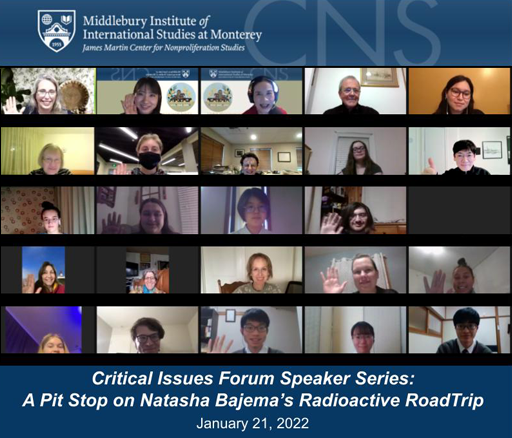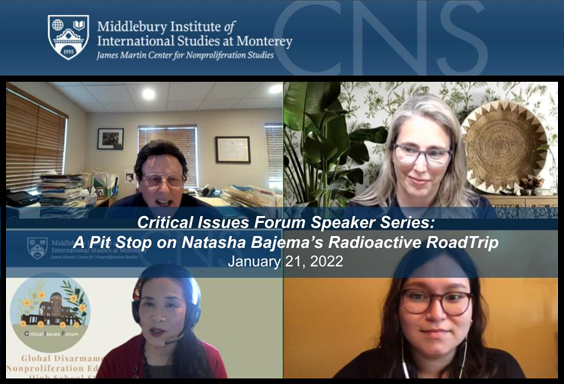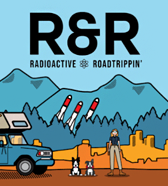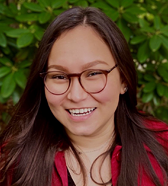January 28, 2022
Masako Toki
Critical Issues Forum: 6th Speaker Series
On January 21, 2022, the James Martin Center for Nonproliferation Studies (CNS) hosted the Critical Issues Forum’s (CIF) sixth Speaker Series inviting Dr. Natasha Bajema, a nuclear expert with over 20 years of experience in the field, to discuss her unique public engagement activities in nuclear risk reduction, nonproliferation and disarmament. The event, titled “A Pit Stop on Natasha Bajema’s Radioactive Road Trip,” provided an exciting opportunity for participants, including high school students, to learn about Dr. Bajema’s journey visiting historic and current US nuclear weapon complex sites.
Watch the Event Recording here!
Throughout her Radioactive Road Trip, Dr. Bajema has conversations with locals about the risks of nuclear war. This unconventional method of raising public awareness of nuclear issues resonates with the Critical Issues Forum (CIF), which aims to raise public awareness, especially among high school students, through disarmament and nonproliferation education. CIF encourages students to create innovative ideas to create a safer and more peaceful world free of nuclear weapons.
CIF Alumna Experience
Before the Keynote speaker presented, CIF alumna Fatima Martinez shared her experience with the CIF project. Fatima represented Alliance Dr. Olga Mohan High School at the 2019 CIF conference at the Middlebury Institute of International Studies at Monterey (MIIS), California. She and her classmates presented research on India and Pakistan’s nuclear tensions. Fatima also represented CIF at the Youth Nuclear Peace Summit for a World Free of Nuclear Weapons in October of the same year in Winnipeg, Canada.

Fatima stated that these experiences, along with her activities for the NuclearFreeSchool club at her alma mater, gave her opportunities to learn about nuclear disarmament and the role of youth in creating peace and security, to develop her critical thinking skills, and to establish friendships with students from her school and around the United States, Japan, Russia and Canada. Fatima is currently majoring in Psychology and minoring in Human Development at Cornell University. As a first-generation student and child of immigrants, she emphasized that experiences like CIF can open doors for students to pursue their dreams.
Keynote Speaker
Dr. William Potter, CNS Founding Director and Dr. Bajema’s former professor at the MIIS (then Monterey Institute), introduced her to the audience with anecdotes that testify her scholarly and professional accomplishments. Dr. Potter was excited about Natasha’s innovative way to educate youth and the public on nuclear issues.
Presentation
Dr. Bajema opened her speech with the origin story of her road trip. She had originally planned to pitch Radioactive Roadtrippin’ as a travelogue show to Netflix or Amazon, but after realizing the low likelihood of success, she decided to use YouTube as a platform to build an audience and raise awareness about nuclear weapons.
After working at the US Department of Defense for over a decade in the field of nuclear risk reduction, Dr. Bajema began to wonder if there was a better way to reduce nuclear risks than writing reports on nuclear dangers. She wanted to explore entertainment and storytelling as alternative methods of reducing nuclear dangers. So, she quit the job in 2019. In the middle of the COVID-19 pandemic, Natasha decided to produce her own show visiting nuclear weapons-related sites with a new camper and a truck and bring her experiences to the public.
In her presentation, Dr. Bajema highlighted how to bring seemingly abstract issues of nuclear weapons closer to people. She mentioned that it’s important to think about nuclear issues as proximate, personal, and present. To address those three p’s, each episode of Radioactive RoadTrippin’ features a visit to a past or current site of the US nuclear weapons complex. This trip is scheduled to last for one year.
Dr. Bajema discussed why regular Americans think nuclear weapons are abstract and far away from their everyday lives. She thinks such problems derive from the way nuclear experts and the media talk about nuclear policy. Topics like nuclear deterrence, nuclear war planning, international nonproliferation laws, arms control, and disarmament sound remote and impersonal to everyday Americans. Dr. Bajema highlighted that nuclear issues are not just ideas to be discussed in Washington DC. In fact, countries that have nuclear weapons require many geographical locations for physical materials, components equipment, factories, and other infrastructure. This makes nuclear weapons integral to providing, jobs, economic stimulus, and federal subsidies in many communities in diverse geographic locations. By revealing these locations, Dr. Bajema aims to make nuclear weapons-related discussions more personal and bring the issues closer to our daily lives.

Dr. Bajema shared a few videos from her first few weeks in Texas including her visit to a mound of uranium tailings in Falls City, a former early warning radar site in Eldorado, and a former top-secret national stockpile site in San Antonio. By visiting such sites and sharing videos of each location, she illustrates how nuclear weapon policy relates to peoples’ lives in the nearby areas. She discusses the impacts of living in a country that possesses nuclear weapons, as well as the risk nuclear weapons pose to us as long as they exist.
Dr. Bajema clarified that although she left her job at the pentagon disillusioned about what the country has achieved to reduce the risk of nuclear weapons, she is not giving up. She believes that real and profound changes are possible by showing people why reducing nuclear weapons is important to our daily lives and our future. She stressed that it requires trying new things and taking some risks if we want to change the nuclear weapons status quo.
After her impassioned presentation, participants asked questions. Most questions came from high school students, demonstrating that they were inspired by Dr. Bajema’s talk. Students asked Dr. Bajema how she accessed nuclear weapons sites, how her previous career in nuclear risk reduction helped her trip, and how social media helps promote her activities. The discussion after her lecture was lively and engaging, especially when Dr. Bajema highlighted the importance of human connections for creating change.
Conclusion
As Dr. Bajema highlighted, sometimes changing the status quo requires starting something new. Dr. Bajema’s creative and courageous decision to launch this her Radioactive RoadTrippin’ show was inspiring to the audience, especially high school students. Dr. Bajema encouraged participants to take initiative in their own lives on issues they care about, “If we are going to start a movement, we are going to have to move ourselves first.”

Dr. Natasha Bajema
“I learned a long time ago that life isn’t about destinations or milestones, it’s about the journey and how it changes you. I follow my passions wherever they lead, and the rest is history.”

See Dr. Bajema’s presentation slides
 Fatima Martinez
Fatima Martinez
“Someday I would like to positively impact the life of a student and give them the opportunity to explore the world because that is simply the opportunity that CIF and my high school teachers gave me.”
Funding
The Critical Issues Forum is supported by the Tom and Sarah Pattison Fund, Saga Foundation, Mr. Gregg Wolpert, and many private donors.
- Visit the Critical Issues Forum Website for more information
- View previous Speaker Series events
